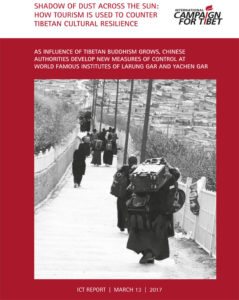
A new report by ICT, ‘Shadow of Dust across the Sun’, reveals how the demolitions and expulsions at Larung Gar and Yachen Gar in the past six months are part of an unfolding political strategy involving more aggressive measures in order to curb and manage the growing influence and number of monks and nuns at these important monastic centers of study and Buddhist ethics in eastern Tibet, the largest such institutes in the world.
The report details how, at the same time as undermining religious practice and teaching and stepping up intrusive security measures, the Chinese authorities are using this very interest in Tibetan Buddhism to attract domestic tourists, leading to fears of further diminishment of these monastic communities, popularly known as ‘encampments’ or ‘chogars’ in Tibetan.
‘Shadow of Dust across the Sun’ is informed by first-hand sources and eyewitness testimony, documenting:
- Major construction work in the vast valley at the foot of Larung Gar to build a new tourist village and other developments – revealing that tourism is now being used as a tool by the Chinese authorities to confront revivalist trends of Tibetan religious and cultural expression and contain monastic growth.
- Infrastructure construction for tourists is described as if this peaceful religious institute were a war zone, with the official media describing the work as a “tough political fight”.
- Heightened security and surveillance at both Larung Gar and Yachen Gar and local towns, including new mobile police stations and intensified militarization in urban areas nearby, consistent with more systematic and intrusive measures across eastern Tibet since the wave of self-immolations began in Ngaba, Sichuan in 2009.
- Official plans for urbanization and tourism focused on presenting an official version of Tibetan religious culture and a ‘happy Kardze’, involving an emphasis on non-religious elements of Tibetan culture, aligned with longer-term strategies to contain dissent, ‘manage’ religious activities and ensure Party control across the prefecture.
In a rare step, six UN experts said publicly last month that they had made a joint submission to the PRC stating that the developments at the Buddhist institutes violate international human rights laws and “seem to be concerted attacks on tangible and intangible cultural heritage, which constitute serious violations of cultural rights of current and future generations.
Matteo Mecacci, President of the International Campaign for Tibet, said: “The new evidence presented in this report calls into question the entire basis of the demolition of homes and expulsion of nuns and monks, which have caused such distress. It cannot be possible for the Chinese authorities to claim there is overcrowding and not enough space for genuine religious practitioners given the extent of construction over a vast area in this remote valley. The UN statement reflects global alarm over the counter-productive razing of homes and expulsion of monks and nuns who have peacefully studied at these world famous religious institutes – which are so precious for Chinese as well as Tibetans.”